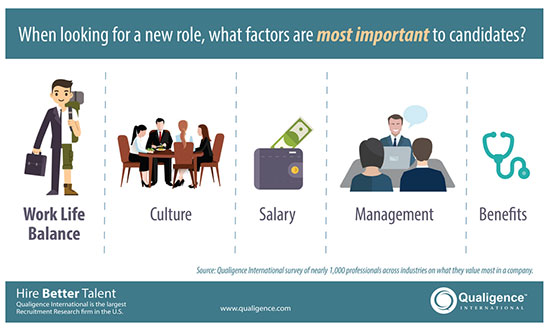 As the competition for talent heats up, so does the race for superior compensation and benefits. While compensation is critical, many sophisticated candidates realize the value of a strong benefits package. Salary and compensation will be negotiated by savvy candidates but sometime the thought is that benefits “are what they are” and cannot be altered. A poor presentation by a hiring manager of your benefits package could cost your business the talented player it seeks. Read the rest of this entry »
As the competition for talent heats up, so does the race for superior compensation and benefits. While compensation is critical, many sophisticated candidates realize the value of a strong benefits package. Salary and compensation will be negotiated by savvy candidates but sometime the thought is that benefits “are what they are” and cannot be altered. A poor presentation by a hiring manager of your benefits package could cost your business the talented player it seeks. Read the rest of this entry »
Employers
The Role of Employee Benefits in Recruitment
by Dave NerzShould Employers Make Counteroffers?
by Dave Nerz So what happens if one of your top employees stuns you with a letter of resignation? Let’s assume he or she has not won the lottery but rather has what they see as a better opportunity lined up. This is a likely scenario as more than 50% of all employees are looking for work, either actively or passively. When you confirm the departure is for a better offer, bigger challenge, or maybe a reason based on your organization structure, culture, or management…the temptation is to begin a counteroffer discussion. Read the rest of this entry »
So what happens if one of your top employees stuns you with a letter of resignation? Let’s assume he or she has not won the lottery but rather has what they see as a better opportunity lined up. This is a likely scenario as more than 50% of all employees are looking for work, either actively or passively. When you confirm the departure is for a better offer, bigger challenge, or maybe a reason based on your organization structure, culture, or management…the temptation is to begin a counteroffer discussion. Read the rest of this entry »
Employee Engagement and Business Success
by Veronica Blatt The Workforce Institute at Kronos commissioned a survey to investigate current levels of employee engagement and its impact on business success. (Disclosure: Kronos is an Industry Partner to NPAworldwide.) Survey respondents included more than 300 professionals in the areas of HR, operations / line of business managers, and employees from companies with more than 600 employees. Industry representation included retail, healthcare, public sector, manufacturing, service, and transportation/logistics. The survey data is interesting; the summary is available for downloading. Read the rest of this entry »
The Workforce Institute at Kronos commissioned a survey to investigate current levels of employee engagement and its impact on business success. (Disclosure: Kronos is an Industry Partner to NPAworldwide.) Survey respondents included more than 300 professionals in the areas of HR, operations / line of business managers, and employees from companies with more than 600 employees. Industry representation included retail, healthcare, public sector, manufacturing, service, and transportation/logistics. The survey data is interesting; the summary is available for downloading. Read the rest of this entry »
In-house vs. Independent Recruiters: What’s the Breakeven for your Business?
by Dave Nerz In-house and independent recruiters play unique roles in the recruitment process, let us start there. While both have a similar objective…fill the open positions…each is likely to use a different approach. In-house recruiters, also known as corporate recruiters, are direct employees of the company and typically work under the direction of the employer’s HR function. Read the rest of this entry »
In-house and independent recruiters play unique roles in the recruitment process, let us start there. While both have a similar objective…fill the open positions…each is likely to use a different approach. In-house recruiters, also known as corporate recruiters, are direct employees of the company and typically work under the direction of the employer’s HR function. Read the rest of this entry »
Stop Asking Job Seekers These Interview Questions!
by Veronica Blatt If you’ve been using the same set of interview questions for goodness-knows-how-long, perhaps it’s time to give your list a second look. And if any of these *gems* (ahem) are there, please, get rid of them now! Read the rest of this entry »
If you’ve been using the same set of interview questions for goodness-knows-how-long, perhaps it’s time to give your list a second look. And if any of these *gems* (ahem) are there, please, get rid of them now! Read the rest of this entry »
Improving the Hiring Process
by Veronica BlattWe are continuing to hear members complaining about an employer’s broken hiring process, too many interviews, and great candidates who “got away” or removed themselves from consideration. With more and more companies lamenting the dearth of qualified candidates, it’s even MORE important to make sure that good candidates don’t become disillusioned and drop out. Qualigence created an infographic that points out some of the factors that have contributed to the current hiring environment: Read the rest of this entry »
Employee Satisfaction at All-time Highs…Yet Retention is at Risk
by Dave Nerz The Society for Human Resource Management has been surveying employee satisfaction since 2002. The results of that survey in 2015 showed job satisfaction is at an all-time high. The percentage of workers that reported being “very satisfied” or “somewhat satisfied” was 88% of those surveyed. Read the rest of this entry »
The Society for Human Resource Management has been surveying employee satisfaction since 2002. The results of that survey in 2015 showed job satisfaction is at an all-time high. The percentage of workers that reported being “very satisfied” or “somewhat satisfied” was 88% of those surveyed. Read the rest of this entry »
Internal HR and Independent Recruiters: Causes of Friction
by Dave Nerz Talent acquisition is red hot in some markets right now. That means that even the best-intentioned and hardest-working internal HR manager/recruiter will find it difficult to keep up with the demands from hiring managers. As internal company recruiters require assistance from the outside, independent recruiters are a common way to supplement internal efforts. Every employer is different, but sometimes this relationship between internal staff and third-party recruiters can become uncomfortable, contentious, and even adversarial.
Talent acquisition is red hot in some markets right now. That means that even the best-intentioned and hardest-working internal HR manager/recruiter will find it difficult to keep up with the demands from hiring managers. As internal company recruiters require assistance from the outside, independent recruiters are a common way to supplement internal efforts. Every employer is different, but sometimes this relationship between internal staff and third-party recruiters can become uncomfortable, contentious, and even adversarial.
Here are some issues that cause friction and suggestions on how internal HR can create “the fix.”
Competition
It will often depend on the employer and the individual recruiters involved, but a search can turn into a competition. Each party is working to outperform the other and along the way creating opportunities for sabotaging the process.
The fix: Independents or third-party recruiters are often paid on a contingency basis. Make sure to give the independent recruiter credit for any action that leads to a hire. Yes, you had the candidate in your database, but you really had zero interest in the candidate until your third-party recruiter updated the candidate’s background and found they were willing to take a pay cut, move halfway across the world or some other condition internal HR had no insight to. Independent recruiters should be viewed as an extension of the internal HR department. They are selling your company to candidates and representing your brand in the marketplace. They want to be successful; let them help. Coach them to better performance; do not sabotage or create more difficult conditions for these folks that are attempting to help you reach a goal.
Urgency
It is not unusual for internal HR to maintain the easier openings to fill and offer the more difficult assignments to the independent recruiter. As this happens, there are limited resources that must be shared including time and access to the hiring manager. This causes an issue because the best candidates are highly sought after by many and reaction time is often critical.
The fix: Create benchmarks for performance. If a candidate is delivered, what is the agreed maximum response time allowed by internal HR? Pick a time and live with it. Hiring managers need to be held accountable for being accessible to recruiters whether the recruiter is internal or external. Hiring managers likewise need to respond in a maximum number of hours to requests for interviews, interview feedback, or details that will allow a candidate to make a yes decision. If these jobs are not urgent, then please tell your independent recruiter to “stand down” until a priority has once again been established. Nobody likes to hurry up and wait. Callbacks the same day or within a 24-hour window is a basis of most businesses. It is a basic requirement of being a good partner…make it happen.
Communication
It is at the root of most issues in business. Independent recruiters expect and deserve the basics of direct, accurate, and timely communication. Sometimes due to the detached relationship and compensation structure of independent resources called in to support internal HR and recruitment, the independent gets slow or less-than-accurate communication.
The fix: When things change, think about who is representing your company in the marketplace. Often that is an independent recruiter. If the job is canceled, the project delayed, the funding canceled, your partner on the outside needs that info immediately. Return calls and emails as you would if it was a great candidate calling or emailing directly, because it very well may be a great candidate being represented by the independent recruiter you have partnered with.
Ego
Sometimes partners that should be supporting each other like to show that they are superior. It is more than just competition when this happens; there is a need to be dominant and have someone subservient to the power that one side can wield.
The fix: We are on the same team. One party may have a better degree or a regular paycheck from an “important” employer, but we are both just trying to do a good job and to help that important employer get the best talent available. Sometimes independents have great instincts honed from the experience of headhunting thousands of successful placements in a lifetime. Sometimes our advice on offers is meant to help you get what you want and need. You are not always right and we are not always wrong. We have different experiences, perspectives and points of view. The more you listen, the better informed you will be. We win when you win.
Obviously this is a very heavily weighted point of view on this subject, from the independent recruiter’s side of the transaction. I’m sure there are other ways to view these situations. Please feel free to correct the errors of my thinking.
Which Factors are Most Important to Candidates?
by Amy TeskeQualigence International surveyed nearly 1,000 professionals across all industries to find out what they value most in an employer when looking for a new role. In other words, business leaders will need to do more than offer a higher salary to make people attracted to their organization. There are several factors that attract candidates.
#1- Work Life Balance- This is important to know that they will not be spending every waking hour working. Candidates want time for family, hobbies and activities. It has been classified as the most important detail, even over salary!
#2- Culture- Candidates want to know what it’s like to work for an organization before starting. It is a valuable asset to have a client who devotes time and resources to an evolving and positive culture. Culture is extremely valuable, especially to new employees.
#3- Salary- This is one we hear every day. The salary attracts candidates, but falls 3rd in line from Culture and Work Life Balance. This data shows the evolution from what recruitment was in the past.
#4- Management- Does the organization have competent and experienced managers? This is critical to a new hire as they want to be challenged and have a member of the company that they can learn from and trust.
#5- Benefits- This does not only encompass health benefits. There are many unique job benefits to attract quality candidates. Health insurance, retirement benefits and paid time off are some of the typical benefits. Some of the creative benefits now being offered are: wellness perks, flexible vacation policies, floating holidays, and paid time off to volunteer.
http://www.hyrell.com/blog/unique-job-benefits-to-attract-quality-candidates
Why Using More than One Recruiter is a Bad Idea
by Veronica Blatt Today’s guest blogger is Jason Elias with Elias Recruitment, specializing in placing lawyers throughout Australia. Jason is a longtime member of NPAworldwide, a previous director, and recipient of the 2014 NPAworldwide Chairman’s Award.
Today’s guest blogger is Jason Elias with Elias Recruitment, specializing in placing lawyers throughout Australia. Jason is a longtime member of NPAworldwide, a previous director, and recipient of the 2014 NPAworldwide Chairman’s Award.
Many employers believe they’ll get a better result and widen the pool of candidates by briefing more than one recruiter. But that’s simply not true for so many reasons.
I know what you’re thinking, of course he’d say that. He wants the commission all to himself!
But forget about trying to find any ulterior motive: using an exclusive recruiter is better for businesses. Here’s why.
5 reasons using multiple recruiters is bad for businesses
- Your recruiters will do less work. Recruiters usually get paid on commissions. On contingent assignments, if they don’t make a placement they’re paid nothing. They’re also usually very busy – at least if they’re any good. Put these two factors together and you can be sure that when you brief multiple recruiters each will spend less time and effort – not more – on filling your position than if they get the job exclusively. After all, no one likes wasting time on work they’re unlikely to be paid for. Many recruiters also end up tripping over candidates who have already been interviewed for other roles so it wastes the candidate’s and the recruiter’s time and reflects poorly on the hiring company.
- You won’t see the best candidates. If a recruiter has “rockstar” candidates they will reserve them as a reward for their loyal clients who have engaged them exclusively in order to cement the relationship and get ongoing exclusive briefs. Furthermore, if a candidate is uncovered during an exclusive brief, the recruiter will hold them for that client whereas for non-exclusive briefs, the candidate may be “shopped around” to several firms so bidding wars and delays become inevitable.
- The focus will shift from quality to speed. While we’re still on the subject, a non-exclusive recruiter’s focus generally shifts from submitting quality candidates to getting things done fast. Many will aim to get their candidates’ CVs registered first so they can lock it in, irrespective of whether their candidates are suitable. This results in more CVs for the hiring manager to review and undermines the value of the recruitment process itself, which is to screen the candidates first. In fact, some less scrupulous recruiters even send CVs without even having interviewed or spoken to the candidate – just so they can log their name first.
- It’s bad for your reputation. Using multiple recruiters can also be bad for an employer’s brand reputation. If candidates hear of the same job from multiple sources it reflects badly on the business, making them seem disorganised or, worse still, desperate and no one wants to work for an employer like that. In the current market, where there is a shift of bargaining power in favour of the good candidates, employers can shoot themselves in the foot and miss out on the top talent.
- You’ll eat up a lot more time in admin. There’s a lot of double handling involved when employers brief multiple recruiters for the same job vacancy. You are better investing time in one recruiter who understands your firm, the culture and what makes a successful candidate. Who needs more paperwork, which just adds time and costs? You will also invariably be dragged in to adjudicate over multiple recruiters claiming to represent the same candidate. This never ends well, with double invoices or, worse still, litigation. The easiest solution can be to pass over the candidate altogether and choose someone else.
Better ways to fill vacancies…
To use an analogy from the legal world, using multiple recruiters is the equivalent of going to five lawyers to draft a shareholders’ agreement and only paying the one you like first.
If you do want the expertise and reach of more than one recruiter on a job there is a solution…
Many recruiters are members of a network where they share their listings with other recruiters. (Elias Recruitment is part of NPAworldwide). In effect, this widens the net for employers without requiring any extra effort on their part. And recruiters with these kinds of arrangements in place are prepared to share their fee to make sure the client gets the best match for their job.
And the best advice is to build a relationship with an exclusive recruiter who is well connected and who has been in the local market recruiting relevant staff for a long time. Also, to protect yourself, select a recruiter who is a member of a peak industry body like the RCSA and must abide by a strict code of conduct to protect both employers and candidates.



